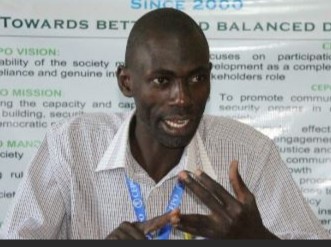By Chol D. Johnson
Civil Society activist Edmund Yakani has urged South Sudan’s judiciary to strengthen the rule of law.
Speaking to this outlet on Monday, the Executive Director of the Community Empowerment for Progress Organization (CEPO), Edmund Yakani expressed concern over the increasing reports of individuals being detained for more than 24 hours without being presented before a court.
He urged the Judiciary to prevent unlawful detentions and enhancing oversight of the justice system to ensure accountability and fairness.
Edmund said illegal detention is a clear violation of human rights.
“The judiciary should ensure that prisons and detention centers operate within the law so that people are not kept for long periods without trial,” Yakani said.
He added, “Rule of law is effective only when the provisions of the law are respected. Manipulating the law undermines both justice and human rights.”
Yakani emphasized that South Sudanese law requires any individual arrested to be presented before a court within 24 hours.
He criticized what he described as a “Khartoum practice” where warrants of arrest are issued early in the week but executed on Fridays; a tactic allegedly used to keep suspects in detention over the weekend when public prosecutors are not on duty.
“This practice is a violation of rights. Some police officers obtain a warrant on Monday but delay arresting the suspect until Friday evening, meaning the person remains in detention through Saturday and Sunday without legal access,” he explained.
Yakani urged the judiciary, public prosecutors, and the Criminal Investigations Department (CID) to take disciplinary action against officers who abuse arrest warrants and delay justice.
“The judiciary and CID must discipline officers who misuse their powers and undermine the rule of law. Public prosecutors also need to conduct regular inspections of police stations and detention facilities,” Yakani stressed.
The activist further called on the judiciary to intensify oversight of prisons to prevent case backlogs and prolonged remand detentions. According to Yakani, many inmates remain in prison for extended periods because judges fail to follow up on pending cases.
Yakani also accused some individuals in positions of authority particularly within the military and national security of abusing their power by ordering arbitrary arrests without warrants.
“Some people who feel powerful use their positions to intimidate innocent citizens,” he said.
“This is common among certain military generals and national security officers who arrest and detain people illegally, sometimes even forgetting about them. Such abuses require strict disciplinary action from their leadership,” Yakani noted.
Yakani concluded by urging the judiciary to take the lead in enforcing accountability within law enforcement agencies and ensuring that justice is served fairly and promptly.




